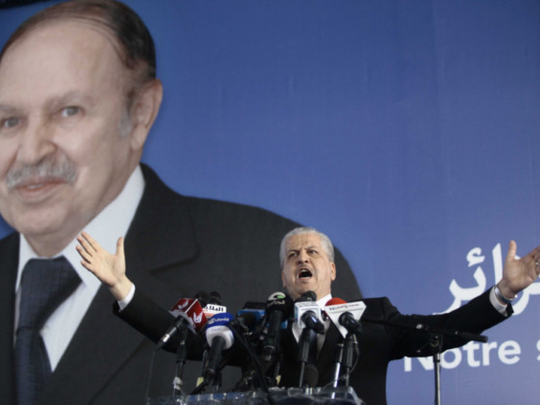
Chlef, Algeria: At a packed sports hall in western Algeria, portraits of President Abdul Aziz Bouteflika gaze down on supporters rallying for his re-election. But the leader himself, weakened by a stroke a year ago, is a no-show.
Throughout campaigning for the April 17 polls, Bouteflika has remained mostly out of the public eye apart from brief television appearances, as he has done since falling ill.
His absences, and his health, have raised doubts about what will happen after the election in an Opec oil exporter that supplies a fifth of Europe’s gas, and plays a significant role in the Western war on Islamist militants.
For now, Bouteflika is campaigning by proxy. With his former prime minister and allies crisscrossing Algeria in his name, the 77-year-old independence veteran is almost assured of a fourth term after 15 years leading the nation.
They promise that Bouteflika, who is credited with ending a civil war in the 1990s between the state and domestic Islamist militants, can keep Algeria stable.
This is a powerful message in a country still traumatised by the conflict that killed 200,000 and left little appetite for the turmoil unleashed on its neighbours after the revolts of 2011 in Tunisia, Egypt, and Libya.
It is a theme that goes down well at the sports hall in Chlef. This is deep in loyalist territory, the farming provinces ravaged by the war where Bouteflika is hailed as the man who delivered peace, and who can keep delivering it.
“He is like a father to us,” said Fatima Benahou, a public administrator at the rally. “He means stability, security. We supported him yesterday, and we are loyal so the least we can do is recognise what he has done.” Opponents dismiss Bouteflika’s bid as the last breath of the old guard from the ruling Front de Liberation Nationale party (FLN) which has dominated Algerian politics since 1962 independence from France.
With the backing of the political machinery of the FLN, army factions and business elite, Bouteflika faces little challenge from rival candidates despite his absences.
On Thursday, state television showed him talking and joking in French with US Secretary of State John Kerry, his longest public appearance in a year.
Since Bouteflika’s illness his allies have strengthened their hand, transferring and firing generals to curb DRS influence over politics, and placing loyalists in top posts.
Once Bouteflika wins another term, however, rival clans may again stake their claims for power under him, positioning for the day they expect he will step aside.
“They are preparing for what comes next. The struggle to see who will succeed will resume after April 17,” said one diplomat.
Bouteflika, a hero of the independence war against France, was first elected in 1999. In office, he helped negotiate a truce ending the civil war that broke out after the FLN cancelled elections which Islamists were poised to win.
In Chlef, many still credit Bouteflika with making Algeria more stable, peaceful and rich. Several thousand supporters and youths rallied at the hall to hear former premier Abdul Malik Sellal praise his credentials, and offer housing, and a new sports stadium.
Horsemen in traditional garb carrying hunting shotguns greeted Sellal outside the hall where banners reading “He gave us a lot, time for us to be loyal” and “My Oath for Algeria” drove home the message that Bouteflika equals stability.
“I am a veteran of the independence war. The only choice I have is to vote for someone like me, someone I can trust,” said Bourezag Bgillali, 83, dressed in traditional robes and turban.
Opposition critics accept Algeria may be more stable, but they also see a country mired in corruption, and political and economic torpor. After decades of state economic controls, a legacy of post-independence socialism, Algeria needs reforms to ease restrictions on foreign investment. Energy output, which makes up more than 90 percent of state revenue, is stagnating.
The five main opposition candidates running against Bouteflika seem to have little hope in a political system critics say has hardly changed since independence, and is still dominated by the FLN and its network of allied parties.
“This country is not even a kingdom, it is private property,” Abdullah Jaballah, said a leader of the Islamist El Adala party, one of several groups that are boycotting the election. “We want a peaceful revolution, not a violent one for change. The least we can do is say no to the election.” Many young Algerians are dismissive of party politics. But protests are more common over food prices, unemployment, housing, services and loans - the same grievances that exploded into revolution in neighbouring Tunisia three years ago.












